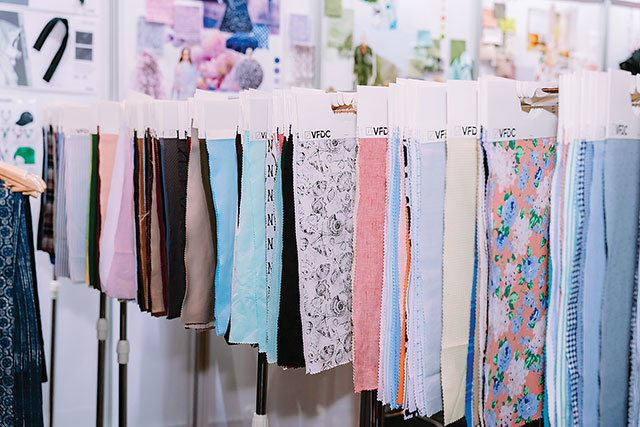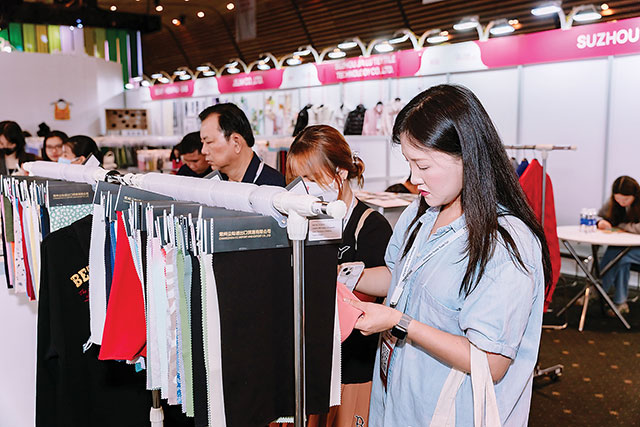

Vietnam is one of the world's largest exporters of clothing, footwear, and furniture, but has been severely affected by the cost-of-living crisis in major markets in Europe and the US, causing a significant decline in the purchasing power of global consumers.
In recent months, although inflation has cooled in some countries, purchasing power is still slow, and inventories are still large, causing businesses exporting textiles and garments, fibers, and even footwear to be short of orders. In this context, the textile and garment industry in Vietnam believes that to improve competitiveness in the market, continue to maintain operations and develop, enterprises have no choice but to follow the path of sustainable production.
The only way: sustainable production
Fabric samples, and fashion collections made from hemp fiber, lotus fiber, coffee grounds, and pandan leaves ... has surprised and delighted visitors at the "International High-End Fabric Exhibition - Texfuture Vietnam Spring-Summer 2023". The trend of greening the textile, garment, and fashion industries is interesting in many businesses in Vietnam when boldly applying new ideas besides modern technology to reduce negative impacts on the environment.

Pineapple fiber fabric and raw pandan leaf fiber of Eco Fiber Research and Development Joint Stock Company (Ecosoi) is a product line that attracts the attention of many people. Beautiful, benign, and absorbing sweat well; Ecosoi's raw pineapple yarn or fabric from pineapple fiber is classified as a sustainable material line, opening up a large domestic and foreign consumption market. Mr. Nguyen Van Hanh, co-founder and production director of Ecosoi, said that developing pineapple fiber is a sustainable garment industry solution, protecting the environment and improving the value of pineapple trees, creating livelihoods for people in rural areas.
Meanwhile, Thien Phuoc Hemp Group Joint Stock Company delighted many partners and businesses in the industry by taking the initiative in the material area of about 6,000ha of hemp throughout the territory of Vietnam. Hemp products of this company are now quite diverse and committed to providing customers right and complete requirements from quality, and quantity to certificates related to technical components according to international standards. Faslink Company brings a series of fabric and fashion products from environmentally friendly materials such as mint fiber, and coconut fiber.
At Texfuture Vietnam Spring-Summer 2023, the first digitized fabric library in Vietnam was introduced. Along with that are the most advanced texture and technology trends in the textile industry such as fabrics combining virtualization technology, 3D technology, functional fabrics with ingredients from recycled materials... Thereby showing that the trend of green technology is taking place strongly in Vietnam's textile and garment industry.

According to Ms. Tran Hoang Phu Xuan, General Director of Faslink Company, during the period of social distancing, businesses began to apply Style 3D design technology, from building a digital fabric warehouse that allows customers anywhere to retrieve information, technical features and textures of each fabric model. The special thing is that from a fabric sample to the finished product according to customer requirements only needs a few days, compared to the previous need of several months. "Thus, this technology not only opens up a marketing channel, reaches customers but also saves huge time and production costs for businesses," said Ms. Tran Hoang Phu Xuan.
Within the framework of the exhibition, at the forum "Circular Economy in the textile industry", Associate Professor – Dr. Nguyen Hong Quan, Director of the Institute for Circular Economy Research and Development (Vietnam National University Ho Chi Minh City) HCMC) said that the circular economy model plays an important role in the green and sustainable development of Vietnam's textile and garment industry. This model needs to be recognized in the whole value chain, from production, and raw material sources to consumption. Accordingly, the textile and garment industry also needs to build an information database and apply modern information technology to promote the implementation of the circular economy model.
"Specifically, the whole industry can build a system and database center of information on circular economy model practices at textile and garment enterprises; promote international cooperation to make use of information, data, techniques, and resources from international organizations; ensure to provide real-time information, periodically update businesses on supply and demand related to by-products, semi-finished products, recycled products ...", Associate Professor – Dr. Nguyen Hong Quan plan...
Source: vneconomy.vn
Aurora Textile Industrial Park - Aurora IP
Nam Đinh Office: Lot HC3, N2 Road, Rang Dong Textile Industrial Park, Rang Dong Town, Nghia Hung District, Nam Dinh Province, Vietnam
Southern Regional Office: 2nd floor, 261H Nguyen Van Troi st.,Ward 10, Phu Nhuan dist.,HCMC, Vietnam
North Regional Office: HCO Building 5th floor, 44B Ly Thuong Kiet st., Hoan Kiem dist., Hanoi, Vietnam
Tel: (0228) 8856 886
Email: [email protected] - [email protected]
Fanpage: www.facebook.com/RANGDONG.AURORAIP